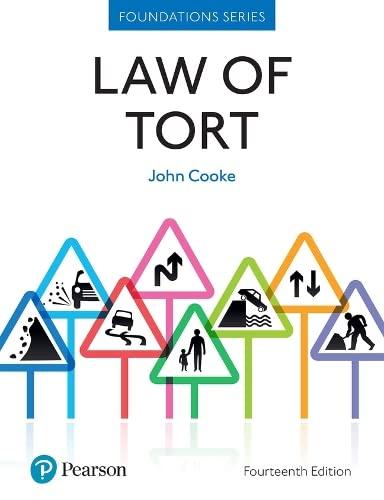Question
This is the case of Bogenberger v. Pi Kappa Alpha Corporation , Inc. Here is the background and facts: Background and Facts David Bogenberger attended
This is the case of Bogenberger v. Pi Kappa Alpha Corporation , Inc. Here is the background and facts:
Background and Facts
David
Bogenberger attended a pledge event at the Pi Kappa Alpha fraternity house at
Northern Illinois University (NIU). The NIU chapter officers planned an evening
of hazing, during which the pledges were required to consume vodka provided by
the members. By the end of the night, David's blood alcohol level was more than
five times the legal limit. He lost consciousness. The chapter officers failed
to seek medical attention. David died during the night. His father, Gary, filed
a complaint in an Illinois state court against the NIU chapter and its
officers, on a theory of negligence. The plaintiff alleged that the defendants
required the pledges, including David, to participate in the pledge event and
to consume excessive and dangerous amounts of alcohol in violation of the
state's hazing statute. The court dismissed the complaint. A state intermediate
appellate court reversed the dismissal. The defendants appealed to the Illinois
Supreme Court.
In the Language of the Court
Justice
FREEMAN delivered the judgment of the court, with opinion.
* * *
*
* * *
Every person owes a duty of ordinary care to all others to guard against
injuries which naturally flow as a reasonably probable and foreseeable
consequence of an act * * * . Where an individual's course of action creates a
foreseeable risk of injury, the individual has a duty to protect others from
such injury. [Emphasis added.] * * * *
To
determine whether the NIU Chapter and officers owed a duty to the pledges, we
look to the reasonable foreseeability of the injury, the likelihood of the
injury, the magnitude of the burden of guarding against the injury, and the
consequences of placing that burden on the defendant. In deciding reasonable
foreseeability, an injury is not reasonably foreseeable where it results from
freakish, bizarre, or fantastic circumstances. Regarding the first two factors,
we cannot say that * * * an injury resulting from hazing is freakish, bizarre,
or occurs under fantastic circumstances. The existence of hazing statutes
across the country, including the [national Pi Kappa Alpha organization's]
written policy against hazing as well as Illinois's hazing statute, indicates
that injury due to hazing is reasonably foreseeable. We also find that injuries
resulting from hazing events, especially those involving the consumption of
large amounts of alcohol, are likely to occur. When pledges are required to
consume large quantities of alcohol in short periods of time, their risk of
injury is greatnot only physical injury due to their inebriated condition but
injury or death resulting from alcohol poisoning [Emphasis added.] Regarding
the last two factors, we find that the magnitude of the burden of guarding
against injury is small and the consequences of placing that burden on the NIU
Chapter and officers are reasonable. To require the NIU Chapter and officers to
guard against hazing injuries is infinitesimal. Hazing is not only against the
law in Illinois, it is against the university's rules as well as the Pi Kappa
Alpha fraternity's rules. There can be no real burden to require the NIU
Chapter and officers to comply with the law and the university's and
fraternity's rules. And it seems quite reasonable to place that burden on the
very people who are in charge of planning and carrying out the pledge event. We
find that the NIU Chapter
and
the officers owed a duty to the pledges, including David, and plaintiff has
sufficiently alleged a claim for negligence against them.
Source-(Business Law: Text and Cases, 15th Edition
Clarkson/Miller)
Question:
Assume for the purposes of this question that there were two students who actively prompted the deceased to drink to excess, knew he was severely intoxicated and abandoned him while he was helpless. Based on the Illinois anti - hazing statute, could those two students face criminal prosecution?
Step by Step Solution
There are 3 Steps involved in it
Step: 1

Get Instant Access to Expert-Tailored Solutions
See step-by-step solutions with expert insights and AI powered tools for academic success
Step: 2

Step: 3

Ace Your Homework with AI
Get the answers you need in no time with our AI-driven, step-by-step assistance
Get Started


